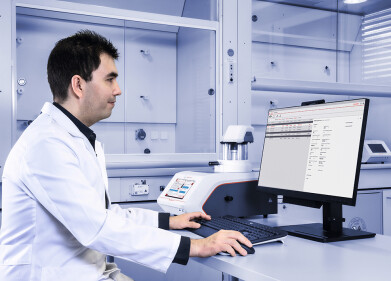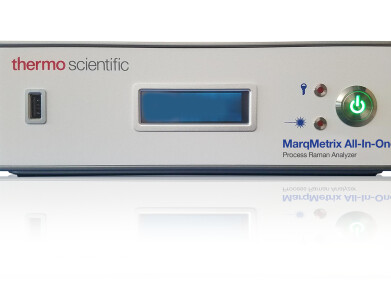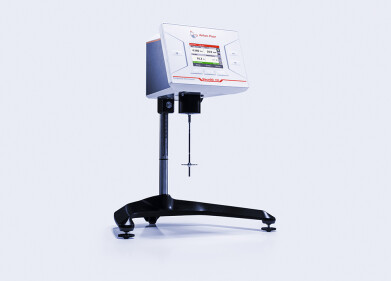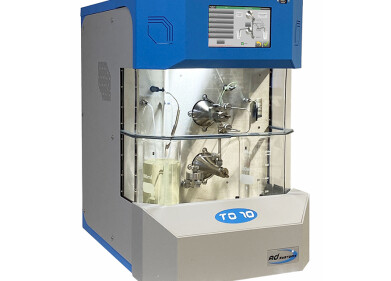Analytical instrumentation
Putting NMR at the core of petrochemical analysis
Nov 25 2020
From oil prospecting to the quality control of final products, there are a wide range of areas in the petrochemical industry where Nuclear Magnetic Resonance (NMR) can play a role. It offers a faster, cleaner and more accurate solution, allowing multiple parameters to be measured quickly and accurately without an extensive knowledge of specific NMR techniques.
From initial exploration, through oil extraction and refinement to quality control, every step of the petrochemical production process depends on precise measurements. Firstly, rock cores must be analysed to help estimate reserves and determine how easily the crude oil can be extracted.
Determining the porosity of the rock and the size of the reservoir can be done easily with Oxford Instruments’ user-friendly GeoSpec range of rock core analysers, which provide petrophysicists, geophysicists, geologists and reservoir engineers with critically important information on the nature and behaviour of fluids in core samples. Oxford Instruments has also joined forces with Green Imaging Technologies to ensure it uses the most up-to-date methodology, and associated software, optimised for their instrumentation.
GeoSpec is the industry standard NMR rock core analyser, with installations in almost every major oil producer and SCAL laboratory world-wide. Three models are available operating at 2, 12 and 20MHz. The GeoSpec 2MHz models are the industry standard for routine measurements of relaxation distributions, allowing the prediction of basic petrophysical parameters such as porosity, free and bound fluid determinations and T2 cut-off.
One of the most important properties of crude oil, from the refining point of view, is its wax (paraffin) content. High wax content has a profound impact on its viscosity and thus its propensity to cause blockages in pipelines and equipment, which can be costly. The MQC+ NMR analyser determines wax content in a quick and easy manner, with minimal sample preparation and is ideal for routine operation in a laboratory or production environment.
The refining process also involves the chemical analysis and characterisation of petroleum products. This is where the X-Pulse 60MHz NMR spectrometer plays its part. Combining variable temperature capability with superior spectral resolution, X-Pulse enables a wide range of petrochemical and polymer processes to be monitored and controlled.
The petrochemicals industry produces a huge number of end products, all of which require stringent quality control to ensure that high standards are maintained. From measurement of the hydrogen content of aviation fuels to check combustion properties, to testing the oil content of waxes used in cosmetics, MQC+ analysers offer faster, cleaner methods than traditional wet chemistry. They can also measure some physical properties such as xylene solubles in polypropylene and the density of polyethylene.
Going one step further, the X-Pulse benchtop NMR spectrometer enables QC methods based on the chemical structure of the products being tested, such as checking the consistency of base oils, monitoring blends, and testing incoming raw materials. X-Pulse is not limited only to hydrogen (proton) measurements – its multinuclear capability means it can also be applied to products containing fluorine, lithium, phosphorus, boron, and many other elements.
Oxford Instruments’ range of NMR solutions encourage the development of new product formulations. TD-NMR (Time Domain NMR), using MQC+, gives valuable information on the physical properties of new materials, while the spectroscopic capabilities of X-Pulse allow compositional changes to be made and tested with confidence during formulation of new products.
NMR is a clean, fast and reliable method that requires minimal training and is available at an affordable cost. It delivers accurate results across the petrochemical production process, optimising yields and quality at every stage.
Digital Edition
PIN 25.5 Oct/Nov 2024
November 2024
Analytical Instrumentation - Picturing Viscosity – How Can a Viscometer or a Rheometer Benefit You? - Sustainable Grease Formulations: Evaluating Key Performance Parameters and Testing Method...
View all digital editions
Events
Jan 20 2025 San Diego, CA, USA
Jan 22 2025 Tokyo, Japan
Jan 25 2025 San Diego, CA, USA
SPE Hydraulic Fracturing Technology Conference and Exhibition
Feb 04 2025 The Woodlands, TX, USA
Feb 05 2025 Guangzhou, China



















